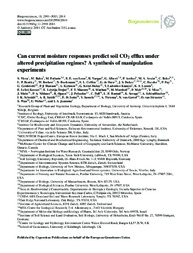Can current moisture responses predict soil CO2 efflux under altered precipitation regimes? A synthesis of manipulation experiments.
Can current moisture responses predict soil CO2 efflux under altered precipitation regimes? A synthesis of manipulation experiments.
Author(s): VICCA, S.; BAHN, M.; ESTIARTE, M.; VAN LOON, E. E.; VARGAS, R.; ALBERTI, G.; AMBUS, P.; ARAIN, M. A.; BEIER, C.; BENTLEY, L. P.; BORKEN, W.; BUCHMANN, N.; COLLINS, S. L.; GATO, G. de; DUKES, J. S.; ESCOLAR, C.; FAY, P.; GUIDOLOTTI, G.; HANSON, P. J.; KAHMEN, A.; KRÖEL-DULAY, G.; LADREITER-KNAUSS, T.; LARSEN, K. S.; LELLEI-KOVACS, E.; LEBRIJA-TREJOS, E.; MAESTRE, F. T.; MARHAN, S.; MARSHALL, M.; MEIR, P.; MIAO, Y.; MUHR, J.; NIKLAUS, P. A.; OGAYA, R.; PEÑUELAS, J.; POLL, C.; RUSTAD, L. E.; SAVAGE, K.; SCHINDLBACHER, A.; SCHMIDT, I. K.; SMITH, A. R.; SOTTA, E. D.; SUSEELA, V.; TIETEMA, A.; VAN GESTEL, N.; VAN STRAATEN, O.; WAN, S.; WEBER, U.; JANSSENS, I. A.
Summary: As a key component of the carbon cycle, soil CO2 efflux (SCE) is being increasingly studied to improve our mechanistic understanding of this important carbon flux. Predicting ecosystem responses to climate change often depends on extrapolation of current relationships between ecosystem processes and their climatic drivers to conditions not yet experienced by the ecosystem. This raises the question of to what extent these relationships remain unaltered beyond the current climatic window for which observations are available to constrain the relationships. Here, we evaluate whether current responses of SCE to fluctuations in soil temperature and soil water content can be used to predict SCE under altered rainfall patterns. Of the 58 experiments for which we gathered SCE data, 20 were discarded because either too few data were available or inconsistencies precluded their incorporation in the analyses. The 38 remaining experiments were used to test the hypothesis that a model parameterized with data from the control plots (using soil temperature and water content as predictor variables) could adequately predict SCE measured in the manipulated treatment. Only for 7 of these 38 experiments was this hypothesis rejected. Importantly, these were the experiments with the most reliable data sets, i.e., those providing high-frequency measurements of SCE. Regression tree analysis demonstrated that our hypothesis could be rejected only for experiments with measurement intervals of less than 11 days, and was not rejected for any of the 24 experiments with larger measurement intervals. This highlights the importance of high-frequency measurements when studying effects of altered precipitation on SCE, probably because infrequent measurement schemes have insufficient capacity to detect shifts in the climate dependencies of SCE. Hence, the most justified answer to the question of whether current moisture responses of SCE can be extrapolated to predict SCE under altered precipitation regimes is ?no? ? as based on the most reliable data sets available. We strongly recommend that future experiments focus more strongly on establishing response functions across a broader range of precipitation regimes and soil moisture conditions. Such experiments should make accurate measurements of water availability, should conduct high-frequency SCE measurements, and should consider both instantaneous responses and the potential legacy effects of climate extremes. This is important, because with the novel approach presented here, we demonstrated that, at least for some ecosystems, current moisture responses could not be extrapolated to predict SCE under altered rainfall conditions.
Publication year: 2014
Types of publication: Journal article
Unit: Embrapa Amapá
Keywords: Mudança Climática, Precipitação pluvial, Rainfall, Solo, Umidade, climate change, humidity, soil
Observation
Some of Embrapa's publications are published as ePub files. To read them, use or download one of the following free software options to your computer or mobile device. Android: Google Play Books; IOS: iBooks; Windows and Linux: Calibre.
Access other publications
Access the Agricultural Research Database (BDPA) to consult Embrapa's full library collection and records.
Visit Embrapa Bookstore to purchase books and other publications sold by Embrapa.

